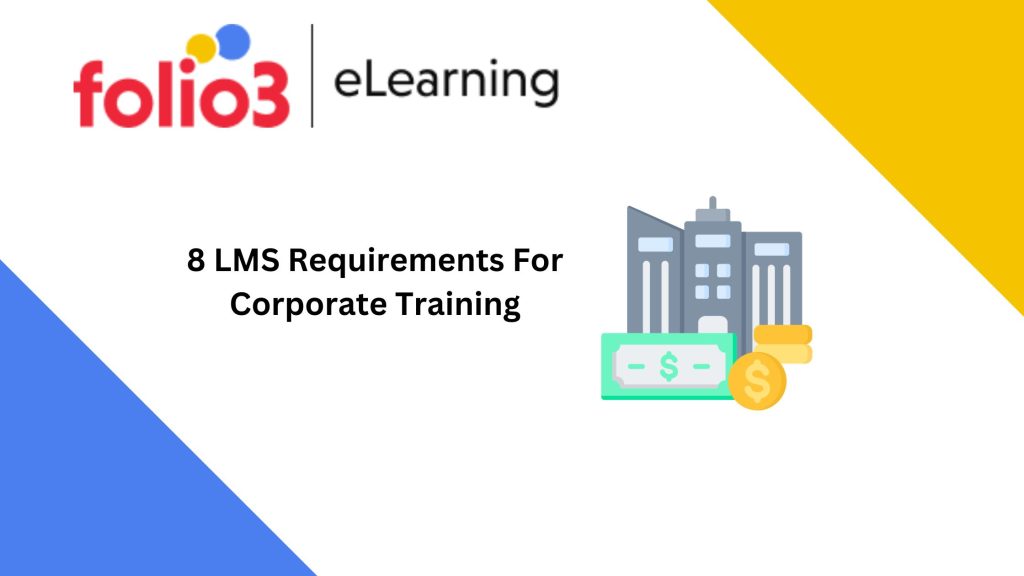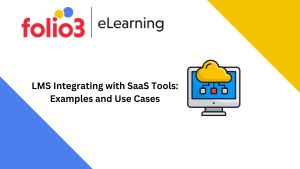
Executive Summary:
Learn about the LMS requirements for effective corporate training in our thorough blog. Learn how an LMS designed for business training may improve learning management, employee development, and organizational effectiveness.
Introduction:
A dedicated Learning Management System (LMS) is essential for fostering employee growth, boosting abilities, and maximizing organizational performance in the ever-changing world of corporate training.
This blog reveals eight crucial LMS requirements that form the cornerstone of a strong and efficient training ecosystem, considering the special requirements of corporate training.

8 LMS Requirements for Corporate Training:
- Customization Capabilities:
Customization features in an LMS for corporate training represent the platform’s intrinsic adaptability to an organization’s identity, brand, and goals. A one-size-fits-all strategy falls short of having the desired effect as organizations adopt corporate training to improve staff skills and increase productivity.
This is where customization comes into play, linking generalized training programs and a customized, business-specific training ecosystem.
An LMS for corporate training has customization features that enable businesses to incorporate their distinctive visual aesthetics, color schemes, and logos into the learning environment. The organization’s identity and values are reinforced among learners thanks to this branding consistency, which also produces a seamless user experience.
- Scalability and User Management:
Scalability and efficient user administration inside a specialized Learning Management System (LMS) designed for corporate training is essential in the dynamic world of corporate training, where organizations span numerous industries, sizes, and locations.
This factor is crucial in coordinating training initiatives’ efficient and effective flow throughout various teams, roles, and departments.
By its very nature, corporate training involves a large and constantly changing audience. The training requirements range widely, from those of entry-level personnel to those of senior executives. Scalability in this context relates to the LMS’s ability to support a growing user base without sacrificing effectiveness, user experience, or learning results.
- Integrated Content Management:
A strong Learning Management System (LMS) created especially for this setting is essential in corporate training, where knowledge transfer and skill development are key components.
An LMS designed specifically for corporate training transforms from a simple distribution platform into a dynamic knowledge base, a learning materials center, and a career advancement driver. The concept of “Comprehensive Content Management” is given priority within this framework.
A wide range of materials, including training modules, interactive lessons, multimedia presentations, and reference materials, can be used in corporate training content. An efficient LMS should provide administrators with user-friendly tools to organize and classify this variety of content efficiently.
- Strong Analytics and Reporting:
The saying “what gets measured gets improved” has enormous significance in corporate training. To evaluate the efficacy and impact of training activities, a dedicated Learning Management System (LMS) created for corporate training must have robust reporting and analytics functions.
These features offer a comprehensive picture of learners’ development, performance, and engagement, turning raw data into useful insights that inform data-driven choices for ongoing improvement.
An LMS for corporate training should provide administrators with thorough dashboards and individualized reports highlighting key performance indicators (KPIs) like completion rates, assessment results, learner participation, and high engagement areas.
- Integration Skills:
By bridging the gap between different systems, an LMS for corporate training may create a unified and integrated training ecosystem. In today’s networked business environment, smooth integration with current corporate tools and systems is essential. The LMS should be capable of establishing a secure connection with platforms for performance management, HR systems, and other pertinent software.
Since learner data is synchronized across platforms thanks to the integration of HR systems, administrative activities are streamlined, and redundant data entry is reduced.
Integration of performance management enables organizations to connect training results with worker performance, permitting thorough performance evaluations and development plans.
- Mobile Compatibility:
Modern workers are known for being energetic and always on the go. Mobile compatibility inside an LMS for corporate training becomes essential in this situation. To provide flexible and on-the-go learning experiences, learners should be able to access training materials and content on various devices, including smartphones and tablets.
Accessing training materials on mobile devices enables learners to interact with them during commutes, in-between meetings, or on the go. It promotes continuous learning by converting unproductive downtime into educational opportunities.
Additionally, mobile compatibility ensures that training efforts are available to geographically and remotely scattered employees, encouraging inclusivity and involvement within the organization.
- Features of Gamification and Engagement
Effective corporate training must focus on engagement, and gamification is a potent way to do so. Badges, leaderboards, awards, and interactive challenges are just a few examples of the gamification tools that may be found in an LMS for corporate training to make learning more interesting and immersive.
An LMS can add a layer of motivation and competition by introducing gamification, which encourages students to finish training modules, hit milestones, and engage in active learning.
Leaderboards encourage healthy competition among workers, inspiring them to perform well and actively contribute. Rewards and badges recognize achievements and increase learner satisfaction and a sense of success.
- Prioritizing Data Security:
Data security must be highly important in an LMS for corporate training. This includes a complex strategy to safeguard data against hacking, breaches, and other dangers. Only authorized users, such as employees and administrators, can access training materials and sensitive information thanks to reliable user authentication procedures.
Encryption methods in transit and at rest give an extra degree of security. This ensures that even if data is intercepted, bad actors cannot comprehend it.
Data is protected during transmission using Secure Socket Layer (SSL) encryption, and stored data is protected using encryption algorithms to prevent unauthorized access.
Conclusion:
The importance of a specialized Learning Management System (LMS) designed expressly for this purpose cannot be overstated in contemporary corporate training, where skill development and knowledge enhancement are of utmost importance.
A thorough grasp of how such a specialized platform may impact employee development and organizational success has been formed by investigating the eight crucial LMS needs for corporate training.
Every aspect of an LMS for corporate training contributes to a vibrant and successful learning ecosystem, from the critical function of customization capabilities in building a unified training culture to the complex dance of scalability and user management that enables seamless expansion.










